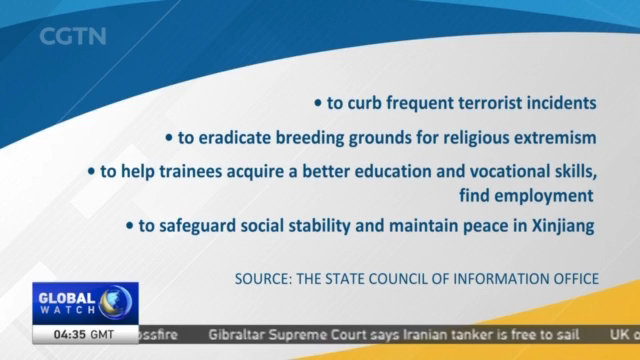
20:14, 27-Aug-2019
Xinjiang Vocational Education White Paper: No extremist incidents have occurred in Xinjiang for nearly three years
Updated
20:21, 27-Aug-2019

On Friday, China's State Council Information Office issued a white paper covering vocational education in Xinjiang. The paper says the improvement of vocational training in Xinjiang has helped with eradicating the threat of religious extremism in the region. The paper adds that vocational education has helped in rehabilitating criminals and upheld basic civil rights. CGTN's Liu Yang has more.
Xinjiang is a key battlefield in the fight against extremism in China. From 1990 to 2016, separatists and religious extremists plotted and carried out several thousand violent acts including bombings, assassinations, poisoning, arson, assaults, and riots in the region. Many innocent people have been killed and several hundred police officers have died in the line of duty. The property losses incurred were enormous.
In an attempt to quell the violence, Xinjiang has established vocational education and training centers to provide employment opportunities. These centers have effectively curbed violence and have boosted security in the region.
The white paper clearly indicates that education and training is not a measure to limit personal freedom. Rather it's an important measure to help trainees to break free from ideas of religious extremism.
The establishment of the education centers is in response to a set of urgent needs which include curbing frequent violent incidents and to help trainees find employment, and increase their incomes, and most of all to safeguard social stability and peace in Xinjiang.
Education and training in Xinjiang is practiced in line with the rule of law in China. The training centers have been established based in accordance with Chinese counter-terrorism law and the Regulations of the Xinjiang Uygur Autonomous Region on Deradicalization.
After graduation, the trainees can choose their own jobs, or employment can be arranged for them with the assistance of relevant authorities.
From January to June 2019, nearly 76 million tourists visited Xinjiang, an increase of 46 percent since 2018. Since the end of December of 2018, nearly 1,000 people have visited Xinjiang. They include foreign diplomatic envoys to China, UN officials, Geneva-based senior diplomats of various countries as well as more than 40 groups of people from political parties, and civil society organizations. Liu Yang, CGTN, Beijing.
SITEMAP
Copyright © 2018 CGTN. Beijing ICP prepared NO.16065310-3
Copyright © 2018 CGTN. Beijing ICP prepared NO.16065310-3